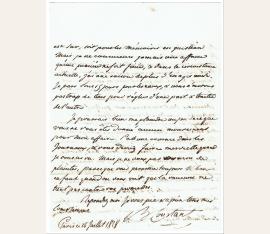Schriftsteller und Staatsmann (1767-1830). Eigenhändiger Brief mit Unterschrift. Paris. 4to. 2 pp.
$ 4,809 / 4.500 €
(89368)
An den Bibliothekar und Verleger Ambroise Dupont über neu erschienene oder noch zu veröffentlichende Werke.
Swiss-French political theorist, author, and statesman (1767-1830). Autograph letter signed. Paris, Maison de Salm. Small 4to. 1½ pp. on bifolium. With autograph address and traces of seal.
$ 4,809 / 4.500 €
(88845/BN58742)
To a lawyer named Malandain, urging him to take action in an affair concerning a widow named Jullien, as it impedes Constant's payment by a C. Arnault, whom he accuses of "misrepresenting his fortune" in order to "frustrate his creditors". Constant sees his interests at risk: "Je comptais avec certitude sur une réponse à ma dernière lettre. Vous me mandiez dans votre précédente que vous déviez revoir la veuve Jullien le 14, & nous sommes au 30. Je vous prie instamment de presser l'issue de cette affaire.
Je vous répète ce que je vous ai mandé précédemment. Cette affaire seule m'empêche d'être payé de C. Arnault, que j’ai raison de croire occupé à dénaturer sa fortune, pour frustrer ses créanciers. Vous voiez combien de plus longs retards seroient préjudiciables à mes intérêts". - The second part of the letter concerns another ongoing affair concerning compensation payments by a Mr. Coquereaumont. Constant suspects that his adversary has moved without indicating his new address: "J'ai écrit de nouveau à mon ci-devant homme d'affaires mais son silence me fait croire qu'il a changé domicile. Je vous ai expliqué, Citoyen, ce qu'il m'avait mandé relativement aux réparations de Coquereaumont. Il se trouvait qu'il m'ait transmis des détails erronés, et qu'il eut consenti des réparations, ce qui doit pouvoir le constater par un acte signé de lui, [...]". - The great thinker and politician Constant was notoriously short of cash throughout his life. In 1816 he fell out with his long-term partner Madame de Staël, not least due to his gambling debts; towards the end of his life King Louis Philip I provided him with a large sum to settle his debts. - With recipient's note in ink and tears from breaking the seal. Some foxing and browning..
Swiss-French political theorist, author, and statesman (1767-1830). Autograph letter signed. Paris. 8vo. ½ p. on bifolium. With autograph address.
$ 2,672 / 2.500 €
(89954/BN59358)
To Augustine Émilie Victorine Destutt de Tracy, Madame de Laubespin, the youngest daughter of Antoine Destutt de Tracy and sister-in-law of Georges Washington de La Fayette, asking her about the specifics of the "sad ceremony that I desire to attend" and whether he will there meet La Fayette or where he might otherwise find him: "Oserais-je vous prier, Madame, de me faire savoir si la triste cérémonie à laquelle je désire assister aura lieu demain & à quelle heures, & si je trouverai Monsieur Georges La Fayette, où dans quel lieu je pourrais le rencontrer".
- A classical liberal of the early 19th century, Constant defined the concept of liberty as a condition of existence that allowed the individual to turn away interference from the state or society. His ideas influenced the Trienio Liberal movement in Spain, the Liberal Revolution of 1820 in Portugal, the Greek War of Independence, the November uprising in Poland, the Belgian Revolution, and liberalism in Brazil and Mexico. - Traces of folds. Some browning. With a tear to the address leaf..



